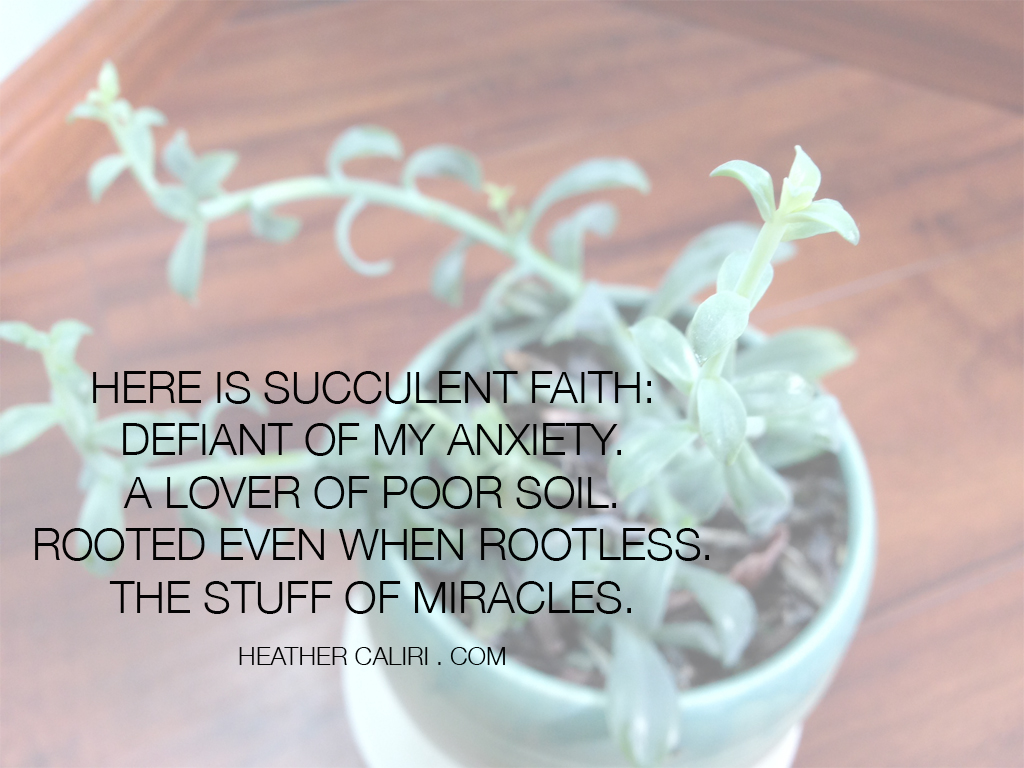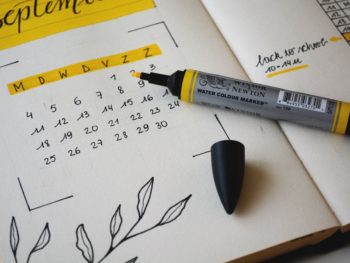
Last year for Christmas, our family received a beautiful succulent in a hand-made ceramic pot; three long shoots poking out of the soil. Its sage-tree leaves picked up the color of the glaze of the pot.
I thought I followed the directions: let the soil get completely dry before watering again. When I poked my finger into the loose soil, and felt no damp, I watered. Not long after, the plant’s stems began to droop, clearly needing more water. I watered again.
More droopiness–so much so that one of the stems broke off completely.
I let the broken stem languish there on the counter for weeks–yes, I am that good at gardening. I kept assuming quick intervention wasn’t worth it since it would be dead by the time I got to it.
But the darn thing did not die, did not die, did not die. Finally, curious, I came closer to see why.
It was alive. In fact, its broken body was healthier-looking than the still-rooted stems. It had grown little roots alongside every single leaf, and they were trying to find purchase in the soil.
This amazed me: the plant was determined.
On the other hand, the rooted stems were still drooping, and when I touched them another fell over. Its stalk snapped right at the soil line.
Why were the rooted ones dying when the “dead” one was still alive?
I peered at the one that had just fallen over, and I realized why.
It had not fallen over because it was parched with thirst. No: it had rotted off in over-watered soil.
I had thought my tiny little bit of watering could not possibly be enough. But this was a plant that flourished in the desert. That survived on air for weeks. It grew roots out of every part of itself to draw in whatever sustenance was near. And my careful, anxious cultivation very nearly killed it instead of helping it flourish.
This is like my faith, I thought.
Jesus compared faith to plants a lot. Full disclosure: I’m not sure he’d go with my take on it here—more often, he talked about fruit-bearing plants, those in gardens that need human cultivation and bear particular fruit.
But the succulent on my shelf reminds me more of his takes on yeast—a force beyond human control that grows despite our intentions or incompetence.
I have thought more watering, more anxious stewarding of my faith would be a good thing, always. Would be ideal. Would be necessary. I have assumed that if I don’t guard the spark of faith with everything I have it will go out.
I have told myself: if you don’t grow your faith, who will?
And then I see this little curl of a plant flourishing when it’s rooted only in air, and dying when I try to keep it alive.
It propagates without my say-so. It knows how to live just like the birds of the air do.
What I see is this: It’s better to pay attention to the plant in front of me than jump to conclusions about what it needs.
Every plant needs particular care, and the wise gardener knows what kind she tends.
Even in the harsh natural world there is grace and abundance.
I wanted to cry when I realized this plant could survive on so little. It had survived despite my incompetence.
God is big. He created all these plants: the succulents and the olive tree, the mustard seed and the grapevine. He has not made each one the same.
Perhaps all I need is air to live sometimes. Perhaps if I don’t feel thirsty, I’m not actually thirsty.
Here is succulent faith: growing best in the worst possible circumstances. Defiant of my anxiety. A lover of poor soil, growing beautiful in the midst of the desert. Flourishing when I least expect it. Needful not of my effort, but of the tender care of the one who created it. Made to multiply through every pore, sending out roots to lick the moisture out of the air.
Rooted even when rootless. A plant of miracles.
Do I have to feel anxious about faith anymore? Can I simply give thanks for its pulsing life in me, and enjoy it when it blooms?














 Revelation Is Not A Guarantee–for The Mudroom
Revelation Is Not A Guarantee–for The Mudroom
And this also, that sometimes the “worst possible circumstance” ARE the best when it comes to growth. I’m a poor hand when it comes to succulents, but my great-grandmother’s Christmas cactus continues to endure despite deep neglect. Nature is so good at reminding us of the mercy that exists and under-girds all things. Thanks for this, Heather.
Thanks, Kelly! Yes: what we think of as “good” is often not ideal in God’s terms.
My black thumb is pretty equals-opportunity too 🙂 So much of gardening (and life) is just paying attention to what works 🙂
Wow, never thought of it this way, but so true. And exactly what I needed to hear today. Thanks!
Hey, thanks! So glad it’s speaking to you 🙂
Hmm. This will be rattling around in my brain for a while. The $3 plants by the checkout at the home improvement store always beg to come home with me…not suspecting they will be alternately neglected for 3+ months and then over-watered to make up for it. Needless to say not many survive. And yet I’ve been surprised by how many seemingly dead plants show signs of new life before I get around to throw them away. I’ve never made this connection with faith before though. How force-feeding myself all the good things might not actually be what I need. How we are all created differently and don’t all need the same things to thrive. This really resonates with me and gives me lots to think about. Thanks, Heather. 🙂
Thanks, Johanna. I have such a love-hate relationship with plants–I feel so much pressure from those tiny pots. LOL.
So glad this resonated with you. The thirst for life in all creatures is astounding.